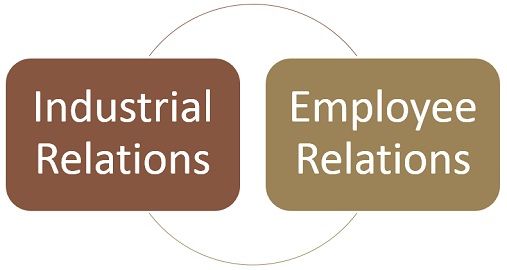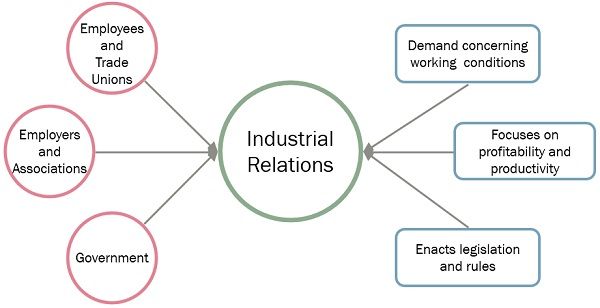 While industrial relations is clearly associated with trade unions, collective bargaining and industrial actions. Employee relations stress on the management of the employment relationship while developing a positive psychological contract.
While industrial relations is clearly associated with trade unions, collective bargaining and industrial actions. Employee relations stress on the management of the employment relationship while developing a positive psychological contract.
Industrial relations and employee relations are the two common terms, which highlights a process through which people and their organization connect and communicate, at the workplace, for reason such as smooth functioning of the organization and their employment.
In this section, we will talk about the difference between industrial relations and employee relations.
Content: Industrial Relations Vs Employee Relations
Comparison Chart
| Basis for Comparison | Industrial Relations | Employee Relations |
|---|---|---|
| Meaning | Industrial Relations is concerned with the relationship and interaction between the management and workforce. | Employee relation refers to the connection and interaction amidst the parties to employment, i.e. employer and employee. |
| Approach | Traditional | Contemporary |
| Conflict Handling | Reactive | Proactive |
| Assumption | Pluralism | Unitarianism |
| Focuses on | Personnel Procedures | Various culture and structure related strategies |
| Job Design | Division of Labour | Teamwork |
| Concept | Narrow | Wide |
| Pay | Standardized, as per job evaluation | Performance-related |
| Promotes | Collectivism | Individualism |
| Includes | Trade unions | Unions and non-unions |
Definition of Industrial Relations
The term Industrial Relations is a combination of two words ‘Industry’ and ‘Relations’. The term ‘industry’ encompasses the companies and economic activity related to the conversion of raw materials into finished goods in which the labours are engaged. And ‘relations’ refers to the employment relationship between employer and employees, employees and employees, employer and trade union, and employees and trade unions.
In Industrial Relations, the employer is represented by the company’s management or employer’s association, whereas the employees are represented by trade unions.
Industrial Relations is a part of human resource management which also deals with the role of the regulatory organization in resolving the dispute. It is concerned with both conflicts and cooperation.
Actors in Industrial Relations
- Employees and Trade Unions: In a manufacturing or production establishment, it is the trade unions which represent employees. They organize and mobilize employees, as per the demands and also communicate with the employers through collective bargaining.
- Employer and Employer’s Association: Employers always prefer a harmonious industrial relation, for the purpose of maintaining the productivity and profitability of the firm. They want the right to hire and fire the workers, shift the factory as per the requirement and convenience and switch to the latest technology, so as to lessen their dependence on employees.
- Government: The role of the government in industrial relation is of a mediator, so as to bring consensus between employer and employees, in case they are not able to reach consensus on their own. Moreover, the government also enacts the rules. and regulations for better discipline and compliance of policies.
Definition of Employee Relations
Employee relations refers to the analysis of rules, regulations and agreements, to manage the employees both as an individual and also as a team. However, preference is given to an individual, as opposed to the collective relationship, which differs from one organization to another. It is all about gaining the commitment of the employees to the accomplishment of the organization’s objectives, in different scenarios.
To be specific, it is concerned with the terms and conditions of employment, issues concerning employment, communicating with employees, etc. It is about maintaining a work environment which fulfils the requirements of the employees and management as well.
Employee Relation has emerged as a replacement of industrial relations, which covers working conditions, compensation and benefits, work-life balance, reward and recognition, improving employee morale, building company culture etc.
An ideal employee relation tends to develop and cultivate a motivated and efficient workforce. It also ensures employees participation in the management decisions, policies for enhancing cooperation, reducing grievances and conflicts. Hence, the subject matter of employee relation is:
- Maintaining organizational culture
- Developing employee engagement
- Resolving conflicts
- Carrying out investigations
- Managing employee discipline
Key Differences Between Industrial Relations and Employee Relations
The difference between industrial and employee relations can be drawn clearly on the following grounds:
- Industrial relations refers to the terms and interaction amidst the labour and management, resulting from a mix of attitudes and approaches concerning the management of industry affairs, for the advancement of the entire industry as well as the economy. On the contrary, employee relation is all about management of the terms and relationship of the employees with the employer organization and with one another.
- Industrial Relations has a traditional approach, whereas employee relations has a contemporary approach.
- When it comes to resolving disputes, industrial relations uses a reactive strategy, while employee relations uses proactive strategy.
- Industrial relations assumes that the employer firm comprises of individuals and groups having varied interests, values and objectives. As against, employee relations assumes that the employer organization is composed of the individuals having common interest, objectives and values, which are congruous and unified.
- While industrial relations focuses on personnel procedures, employee relations stress on various culture and structure related strategies.
- Talking about job design, industrial relations follows the division of work, but in the case, employee relations teamwork is preferred.
- Industrial Relations takes into account the heavy extractive and manufacturing sector of employment, as well as it is assumed that the sector is a male dominating one who works for a full-time basis. Whereas employee relations considers the service sector along with the manufacturing sector, which employs approximately 70% of the people in developed economies, Moreover, women employees are also considered in it, and part-time, contract-based employees are also included.
- In industrial relation, compensation is standardized and it is based on job evaluation. As against, in employee relation compensation is performance-related.
- In industrial relations, unions are acceptable. As against, in the case of employee relations, there is no desirability of unions, as it covers both union and non-union situations and relationships.
- Employee relations promotes individualism so that the employees relate to their employers. Industrial relations promotes collectivism, so as to manage the labour.
Conclusion
We all know that it is not the machines, gadgets or computers which performs the work itself, rather, it is the workforce of any organization which makes or breaks it. Therefore, maintaining a good relationship with them is of utmost importance.
Employee relations is wider in terms of employment relationship than industrial relation, as the latter is related to happenings between an organization’s management and trade unions only.







Leave a Reply